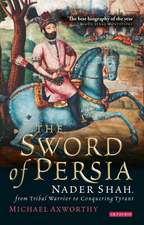Lebanon: A History, 600 - 2011: Studies in Middle Eastern History
Autor William Harrisen Limba Engleză Paperback – 15 ian 2015
Din seria Studies in Middle Eastern History
- 31%
 Preț: 948.01 lei
Preț: 948.01 lei - 7%
 Preț: 126.28 lei
Preț: 126.28 lei - 30%
 Preț: 952.96 lei
Preț: 952.96 lei - 31%
 Preț: 950.87 lei
Preț: 950.87 lei - 18%
 Preț: 324.87 lei
Preț: 324.87 lei - 34%
 Preț: 693.29 lei
Preț: 693.29 lei - 22%
 Preț: 383.89 lei
Preț: 383.89 lei - 22%
 Preț: 202.66 lei
Preț: 202.66 lei - 30%
 Preț: 531.96 lei
Preț: 531.96 lei - 21%
 Preț: 527.58 lei
Preț: 527.58 lei - 34%
 Preț: 536.16 lei
Preț: 536.16 lei - 50%
 Preț: 809.38 lei
Preț: 809.38 lei - 31%
 Preț: 887.43 lei
Preț: 887.43 lei - 31%
 Preț: 861.39 lei
Preț: 861.39 lei - 30%
 Preț: 570.83 lei
Preț: 570.83 lei - 28%
 Preț: 466.20 lei
Preț: 466.20 lei - 31%
 Preț: 921.06 lei
Preț: 921.06 lei - 19%
 Preț: 373.33 lei
Preț: 373.33 lei - 31%
 Preț: 873.88 lei
Preț: 873.88 lei - 28%
 Preț: 328.24 lei
Preț: 328.24 lei
Preț: 270.45 lei
Preț vechi: 312.30 lei
-13% Nou
Puncte Express: 406
Preț estimativ în valută:
51.77€ • 56.25$ • 43.51£
51.77€ • 56.25$ • 43.51£
Carte tipărită la comandă
Livrare economică 09-15 aprilie
Preluare comenzi: 021 569.72.76
Specificații
ISBN-13: 9780190217839
ISBN-10: 0190217839
Pagini: 400
Ilustrații: 35 halftones
Dimensiuni: 172 x 231 x 23 mm
Greutate: 0.59 kg
Editura: Oxford University Press
Colecția OUP USA
Seria Studies in Middle Eastern History
Locul publicării:New York, United States
ISBN-10: 0190217839
Pagini: 400
Ilustrații: 35 halftones
Dimensiuni: 172 x 231 x 23 mm
Greutate: 0.59 kg
Editura: Oxford University Press
Colecția OUP USA
Seria Studies in Middle Eastern History
Locul publicării:New York, United States
Recenzii
William Harris has written an expansive political and institutional history of Lebanon.....Offers a historical context and a set of arguments for considering the past and present of this complex, divided and vulnerable country....The book is well-sourced....The writing is clear and crisp [and] the reader never loses track of the narrative's thread....Harris's account offers much food for thought.
This book is a welcome addition to the historiography of the modern Middle East... [A]n impressive achievement....Harris seems as much at home in the medieval and early modern periods as he is in the more modern and contemporary period
This book is a major contribution to the social history of modern Lebanon.
This book will provide scholars with a useful and overdue reference.
One of the few recent works in English on the complete history of Lebanon in the Islamic period. Most books have strengths and shortcomings. Harris's study is almost completely free of the latter. An excellent volume.
The history of Lebanon remains culturally and religiously complex, and with this work, Lebanon: A History, William Harris presents the reader with both a blueprint and a roadmap. Wither well-written prose and clear evidence, the author enables readers to navigate and unlock the labyrinth of Lebanese history -its people and its culture.
Fifteen hundred years of history is a monumentally long and perilous journey that any historian, gifted and competent as he may be, would be foolhardy to undertake. Yet Harris promises and delivers history in the longue durée, in a gripping seamless narrative, bringing clarity, class, and depth to a story a rare few can tell without disorienting themselves and losing their readers along the way....A meticulous, ambitious, and compelling story of Lebanon.
William Harris, a recognized scholar of the Levant, provides a nuanced narrative of this often fractious nation.
This Herculean effort is the best book about Lebanon to come out in the past half decade. Intense at the beginning, where the author had to grapple with a scarcity of resources and the confusing jumble and black hole of ethnicities in the post-Roman collapse, the book is compact in the second half, which Lebanon became central to Roman attempts to penetrate and hold the Levant. The book is compelling, easily readable, digestible, and understandable. Essential.
A successful account that provides much of value for those interested not only on Lebanese history but also that of the Middle East. The limitations of Ottoman control and complexities of ethnic and confessional politics emerge clearly.
A signal contribution to the study of Lebanon. William Harris savors that country and knows its ways. With this book, he steps forth as one of the very best historians of Lebanon. With no ax to grind, this is history in the finest tradition.
William Harris discovered Lebanon in its darkest hours, and became an intimate. Few are better qualified to write an overview of Lebanese history, as he has done here in this excellent book, the outcome of decades of such intimacy.
Lebanon is defined by its religious diversity, its communities long predating the modern state. In this lucid and engaging new history, William Harris traces the evolution of the Christian, Muslim, and Druze communities of Mount Lebanon over fourteen centuries, the better to understand the dangerous sectarian democracy of modern Lebanon. A bold and authoritative analysis based on Arabic and European sources that will guide Western readers through the maze of Lebanese history and politics.
This book is a welcome addition to the historiography of the modern Middle East... [A]n impressive achievement....Harris seems as much at home in the medieval and early modern periods as he is in the more modern and contemporary period
This book is a major contribution to the social history of modern Lebanon.
This book will provide scholars with a useful and overdue reference.
One of the few recent works in English on the complete history of Lebanon in the Islamic period. Most books have strengths and shortcomings. Harris's study is almost completely free of the latter. An excellent volume.
The history of Lebanon remains culturally and religiously complex, and with this work, Lebanon: A History, William Harris presents the reader with both a blueprint and a roadmap. Wither well-written prose and clear evidence, the author enables readers to navigate and unlock the labyrinth of Lebanese history -its people and its culture.
Fifteen hundred years of history is a monumentally long and perilous journey that any historian, gifted and competent as he may be, would be foolhardy to undertake. Yet Harris promises and delivers history in the longue durée, in a gripping seamless narrative, bringing clarity, class, and depth to a story a rare few can tell without disorienting themselves and losing their readers along the way....A meticulous, ambitious, and compelling story of Lebanon.
William Harris, a recognized scholar of the Levant, provides a nuanced narrative of this often fractious nation.
This Herculean effort is the best book about Lebanon to come out in the past half decade. Intense at the beginning, where the author had to grapple with a scarcity of resources and the confusing jumble and black hole of ethnicities in the post-Roman collapse, the book is compact in the second half, which Lebanon became central to Roman attempts to penetrate and hold the Levant. The book is compelling, easily readable, digestible, and understandable. Essential.
A successful account that provides much of value for those interested not only on Lebanese history but also that of the Middle East. The limitations of Ottoman control and complexities of ethnic and confessional politics emerge clearly.
A signal contribution to the study of Lebanon. William Harris savors that country and knows its ways. With this book, he steps forth as one of the very best historians of Lebanon. With no ax to grind, this is history in the finest tradition.
William Harris discovered Lebanon in its darkest hours, and became an intimate. Few are better qualified to write an overview of Lebanese history, as he has done here in this excellent book, the outcome of decades of such intimacy.
Lebanon is defined by its religious diversity, its communities long predating the modern state. In this lucid and engaging new history, William Harris traces the evolution of the Christian, Muslim, and Druze communities of Mount Lebanon over fourteen centuries, the better to understand the dangerous sectarian democracy of modern Lebanon. A bold and authoritative analysis based on Arabic and European sources that will guide Western readers through the maze of Lebanese history and politics.
Notă biografică
William Harris is Professor of Politics at the University of Otago. He has taught at Princeton University, Haigazian University College in Beirut, Middle East Technical University in Ankara, and the University of Exeter. He is the author of The Levant: A Fractured Mosaic and Faces of Lebanon: Sects, Wars, and Global Extensions.














